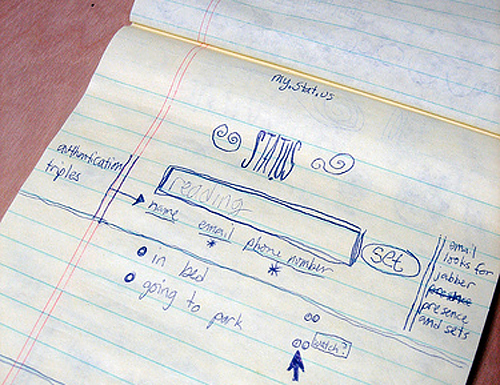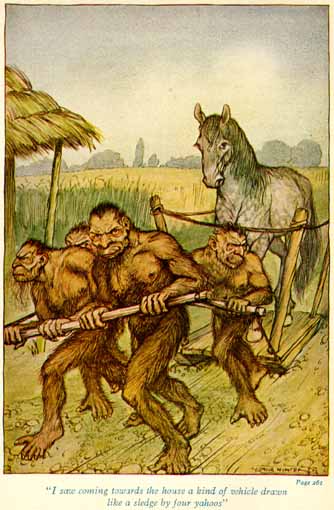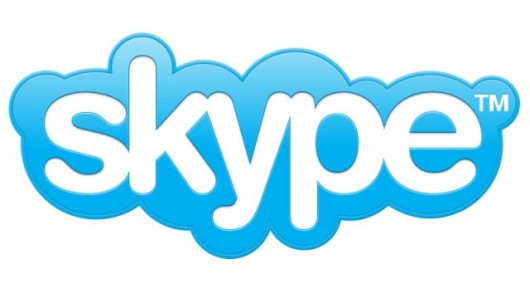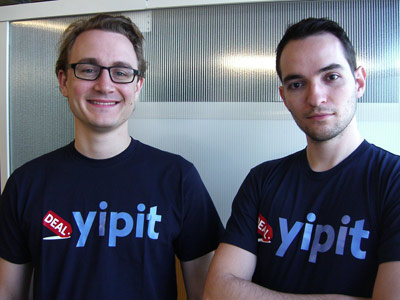"What's in a name?" - a stupid guide to choosing a startup name
I present for your review my first topic, in which I would like to share interesting stories with readers about the appearance of some sensational project names in the IT industry.
Initially, the working name in the future of a very popular service was simply “Status” or “Stat.us”. However, time passed, the project entered the final stage of development and it was time to look for an official name. In search of a suitable name, the authors decided to focus on the similarity of their brainchild with SMS service, so the name was decided to choose from near-telephone subjects. So the word “twitch” arose, which, in their opinion, when pronounced, resembles the sound of a phone crawling from vibration.
“We wanted to reflect in the title the idea that the user's thoughts literally make their friends' pockets buzz” - this is how the creator of the service, Jack Dorsey, voiced his choice of name. But the word "twitch" did not seem entirely successful, so it was decided to look into the dictionaries of the surrounding pronunciation words. And they got to the very point - “twitter”, which was defined as “instant burst / release of non-essential information”. Another definition is “birds chirping.” The name was simply ideally associated with the idea of service and left no other choice.

Zynga is a developer of social online games, the creator of an epidemic called FarmVille. A company in whose games 270 million active users spend time every month. A company whose estimated cost is somewhere between $ 15 and $ 20 billion. A company named by its founder Mark Pincus ....... in honor of his deceased dog - an American bulldog named Zinga.

The most famous search engine in the world was created in 1996 under the name "BackRub". In 1998, the name was changed to Google, derived from the mathematical term “googol” , meaning a number in the decimal number system represented by a unit with 100 zeros, which reflected the essence of a search system that provides access to unlimited information.

In 1994, the site, created by Stanford University faculty members David Filo and Jerry Yang, had a completely dubious title: "Jerry and David's Guide to the World Wide Web." Then the name turned into "Yet Another Hierarchical Officious Oracle" or in abbreviated form - Yahoo. Although the founders of the site also like to give another version: the name appeared in honor of a group of vile, wild and rude creatures from Jullan Swift's work "Gulliver's Travels". The name was chosen by Jerry and David during that period of life when, according to them, they felt themselves in a mood somewhat similar to these literary prototypes. The name turned out to be biting, memorable and successfully stuck.

Initially, the project was called “Sky peer-to-peer”, which reflected the essence of the technologies underlying it. This name was abbreviated to “Skyper”, however, while trying to register it, difficulties arose - such domain names already existed. Therefore, without further ado, the last “r” was discarded and the service received the name by which we know it - Skype.

In 1997, Bob Parsons founded Jomax Technologies. In 1999, it was decided to rename the company into something more memorable. Among the employees of the company, a brainstorming was organized, and one of its participants was offered the name "Big Daddy". The name seemed amusing, but it turned out to be busy. And then Bob proposed a slightly modified version - "Go Daddy", which was accepted. Why? “Because it makes people smile and settles in memory,” says Bob. Well, in addition, very memorable advertising moves of the company contribute to this.

Creating an aggregator of discount services, the authors faced a serious problem - all the suitable names that could be associated with the service are already taken. The search for a name turned into a continuous headache - days of painful choice, money spent on domains and names that were consonant with it, which immediately caused discontent, irritation and were rejected as inappropriate. As a result, a list was formed of the names that did not cause the most rejection: streetcake, frankencity, 1gotham, citybat, noocher, zaxme. But this list did not bring satisfaction either. Then an idea was born.
I wanted to pick up a short, sonorous name. Probably almost everyone has ever heard the phrase "google it". “We hoped that the day would come when the service would become so popular that its name would be used in a similar sense,” the authors of the project said. So the idea came up to use “it” at the end. Well, then a purely programmatic approach triumphed. A simple Python script was written that generated the sequence [consonant] [vowel] [consonant] it.com. It turned out 2,205 variants of domain names. Of these, 400 were free at that time (May 2008). The names as a whole were terrible, but among them there was something that delighted the creators with its simplicity and brightness - yipit.com. A brief survey of acquaintances confirmed the correctness of the choice, and most importantly, the process of selecting a name took 30 minutes.

Twitter - non-essential twitter
Initially, the working name in the future of a very popular service was simply “Status” or “Stat.us”. However, time passed, the project entered the final stage of development and it was time to look for an official name. In search of a suitable name, the authors decided to focus on the similarity of their brainchild with SMS service, so the name was decided to choose from near-telephone subjects. So the word “twitch” arose, which, in their opinion, when pronounced, resembles the sound of a phone crawling from vibration.
“We wanted to reflect in the title the idea that the user's thoughts literally make their friends' pockets buzz” - this is how the creator of the service, Jack Dorsey, voiced his choice of name. But the word "twitch" did not seem entirely successful, so it was decided to look into the dictionaries of the surrounding pronunciation words. And they got to the very point - “twitter”, which was defined as “instant burst / release of non-essential information”. Another definition is “birds chirping.” The name was simply ideally associated with the idea of service and left no other choice.

Zynga - say a word about poor bulldog
Zynga is a developer of social online games, the creator of an epidemic called FarmVille. A company in whose games 270 million active users spend time every month. A company whose estimated cost is somewhere between $ 15 and $ 20 billion. A company named by its founder Mark Pincus ....... in honor of his deceased dog - an American bulldog named Zinga.

Google is fun math
The most famous search engine in the world was created in 1996 under the name "BackRub". In 1998, the name was changed to Google, derived from the mathematical term “googol” , meaning a number in the decimal number system represented by a unit with 100 zeros, which reflected the essence of a search system that provides access to unlimited information.

Yahoo! from the house that Swift built
In 1994, the site, created by Stanford University faculty members David Filo and Jerry Yang, had a completely dubious title: "Jerry and David's Guide to the World Wide Web." Then the name turned into "Yet Another Hierarchical Officious Oracle" or in abbreviated form - Yahoo. Although the founders of the site also like to give another version: the name appeared in honor of a group of vile, wild and rude creatures from Jullan Swift's work "Gulliver's Travels". The name was chosen by Jerry and David during that period of life when, according to them, they felt themselves in a mood somewhat similar to these literary prototypes. The name turned out to be biting, memorable and successfully stuck.

Skype is a victim of circumcision
Initially, the project was called “Sky peer-to-peer”, which reflected the essence of the technologies underlying it. This name was abbreviated to “Skyper”, however, while trying to register it, difficulties arose - such domain names already existed. Therefore, without further ado, the last “r” was discarded and the service received the name by which we know it - Skype.

GoDaddy - Naughty Daddy
In 1997, Bob Parsons founded Jomax Technologies. In 1999, it was decided to rename the company into something more memorable. Among the employees of the company, a brainstorming was organized, and one of its participants was offered the name "Big Daddy". The name seemed amusing, but it turned out to be busy. And then Bob proposed a slightly modified version - "Go Daddy", which was accepted. Why? “Because it makes people smile and settles in memory,” says Bob. Well, in addition, very memorable advertising moves of the company contribute to this.

Yipit - programmer's approach
Creating an aggregator of discount services, the authors faced a serious problem - all the suitable names that could be associated with the service are already taken. The search for a name turned into a continuous headache - days of painful choice, money spent on domains and names that were consonant with it, which immediately caused discontent, irritation and were rejected as inappropriate. As a result, a list was formed of the names that did not cause the most rejection: streetcake, frankencity, 1gotham, citybat, noocher, zaxme. But this list did not bring satisfaction either. Then an idea was born.
I wanted to pick up a short, sonorous name. Probably almost everyone has ever heard the phrase "google it". “We hoped that the day would come when the service would become so popular that its name would be used in a similar sense,” the authors of the project said. So the idea came up to use “it” at the end. Well, then a purely programmatic approach triumphed. A simple Python script was written that generated the sequence [consonant] [vowel] [consonant] it.com. It turned out 2,205 variants of domain names. Of these, 400 were free at that time (May 2008). The names as a whole were terrible, but among them there was something that delighted the creators with its simplicity and brightness - yipit.com. A brief survey of acquaintances confirmed the correctness of the choice, and most importantly, the process of selecting a name took 30 minutes.

